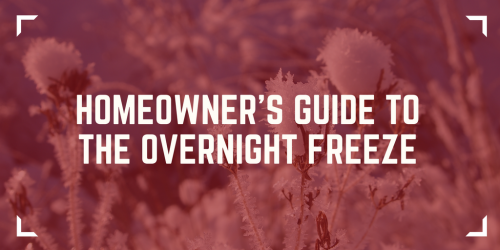Blog
Homeowner's Guide to the Overnight Freeze

New Orleans homeowners are used to extreme heat, but how do we handle the weather dipping below freezing? We have a few tips for preparing your home for an overnight freeze in the coming months:
Garage doors
Keep your garage door closed. Leaving it open will raise your heating bill, especially if you don’t close it at night. Garages are already an unheated part of your home and acts as a heat sink, draining warmth from your home, but you can avoid the worst of it if you keep the door shut. This will help insulate the rest of your home against the chill outside.
Pipes
It’s important to regularly check your home’s exterior for large holes where pipes and wires enter. If the holes are substantial, consider insulating them with foam. Wherever your pipes are exposed to the weather, cover them with foam as well. This video can help you figure out which parts of your pipes to cover and how to do it.
On extremely cold nights, and before you travel out of town during cold fronts, shut off external water sources. These are the levers that control whether your garden hose and sprinklers have access to water. Usually, there will be a valve inside your home to shut off.
To winterize your interior, let faucets drip overnight when temperatures will be below freezing to avoid freezing the lines. Make sure you turn the handle for both the hot and cold water.
Pets
If you have an outdoor pet, bring them inside on extremely cold nights, or buy an animal-safe heating pad so they can keep warm. Check out these tips from the ASPCA for more information.
Exterior Plants
Bring plants in containers indoors so they can avoid frost. If your plants are in a garden, or you’d like to leave them outdoors, cover them in blankets or tarps overnight so any frost will accumulate on the cover and not the plant itself.Make sure to thoroughly water plants before a freeze, because the consequences of a freeze will cause your plant to dry out and potentially die.
The same can happen to your lawn during the winter, and it’s important to keep objects off the grass for extended periods of time. Their weight will kill the lawn underneath. Fertilizing your lawn before the first frost will help grass store nutrients it needs to stay alive over the winter, but isn’t necessary.
Strong Shield Siding shields your home for the future -- whether that means hurricanes, hail storms, or the normal course of winter. For more tips about keeping your home safe, check out our weekly blog posts.




